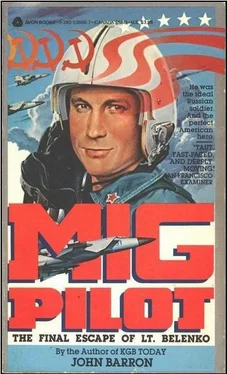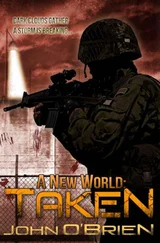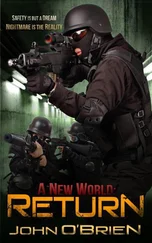Upon completion of the formal debriefings of Belenko, which lasted roughly five months, General Keegan commented: “The value of what he gave us, what he showed us is so great that it can never be measured in dollars. The people of the United States and the West owe him an everlasting debt. He grew up in a brutal, bestial society. In the military, he lived, despite his elite status, in a moral junkyard. Yet he came out of it as one of the most outstanding young studs, one of the most honest, courageous, selfreliant young men I have ever known of. I would love to have him as a pilot in the U.S. Air Force or Navy.”
Other Americans who came to know Belenko felt much the same way. But his future was far from secure. He had yet to confront the greatest crisis of his life.
CHAPTER VIII
The Final Escape
The CIA and Air Force did their best to steel Belenko against one danger that was foreseeable.
No matter how knowledgeable, perspicacious, intelligent, and helpful an escapee from the Soviet Union may be, there inevitably arrives a time when his special knowledge is exhausted. The initial, intense drama that binds interrogated and interrogators together personally and intellectually in a common cause sooner or later must end. The Americans who have been daily or frequent companions, who have formed for the Russian a kind of spiritual lifeline in a bewilderingly strange society must disperse and depart for other duties. And the Russian must begin a new life which only he can finally forge.
The KGB habitually warns military officers, Soviet civilians allowed abroad, and its own personnel that should they defect, “The Americans will squeeze you like a lemon, and once they have squeezed you dry, they will throw you into the garbage like a peel.” Unless the transition from dependence to independence is accomplished adroitly, the Russian may feel that he is being thrown away. The consequent sense of abandonment, betrayal, aimlessness, and loneliness can cause disabling depression or destructive paranoid behavior.
Throughout the months of interrogation, Gregg, Anna, Peter, and others strove to gird Belenko for the transition by frankly explaining what it eventually would entail, exposing him to differing facets of American society, and giving him practical knowledge. Anna stimulated him to think about making the kind of choices, large and small, which are mostly unnecessary in the Soviet Union. To illustrate, she asked: Do most Soviet citizens have to decide which apartment or house they will rent or buy, where they will shop, which type of clothes to wear, which television station to watch, which newspapers to read, which brands of products they prefer, where they will vacation, which route to take when traveling, in which motel or hotel they will stay, which theater to attend, which make of car they will drive and where they will buy it, which physician will treat them?
No, of course not. In that country you take whatever they will give you, whatever you can find. You don’t choose. They choose. Or luck chooses.
The CIA deliberately waited until the end of the interrogations to prepare Belenko financially. He never asked for or about money; he worked and gave sedulously of his own free will. By waiting until all had been given, the CIA tried to connote to him its appreciation that neither he nor all he brought was for sale. Nevertheless, both fairness and U.S. national interests required handsome recompense. The value of Belenko’s contributions, as everyone who knew of them agreed, was inestimable, and however indifferent he was to money, he deserved reward. Successfully and healthily integrated as an American, he would remain an asset to the military and intelligence establishment for many years. His success in the United States would tend to invite future defections; his failure, to deter them.
Hence, the CIA told Belenko that the United States felt it owed him a debt. Considering the sacrifices of status and career he had made to give so much to the United States, it would be unfair to ask him to start in a foreign country with nothing. Accordingly the CIA had established an irrevocable trust, to be managed by competent financial experts, that would yield him a generous income for the rest of his life.
With this guaranteed income, Belenko could live anywhere he wished, do virtually anything he wanted without having to earn a living. He could enroll in a university and take a degree in any of the subjects that had engrossed him as an adolescent — medicine, biology, psychology, physics. He could open some kind of shop to exercise his mechanical aptitudes and interests. He could make his way into commercial aviation. Or he could do nothing except fish, hunt, read, and fly his own private plane.
Belenko was grateful for the offer and the way it was made, but it did not overjoy him or resolve any of the issues that most concerned him. Although he came from a society where scarcity obsesses most people with materialism, he was one of the least materialistic of men. He did not have a pair of shoes until he was six, wore the same shirt and trousers for five years as a teenager, and, aside from his uniforms, never owned a suit until the Japanese gave him one. After marriage, he purchased a television, refrigerator and furniture, not for himself but in hope of pleasing and making a home for his bride. He felt no impulse now to compensate or overcompensate for past deprivations; he still aspired to live by the code of Spartacus. He did cherish the Air Force flight suit and the Navy flight jacket; he did want a car because in America it was a necessity and an instrument of freedom. Otherwise, he did not covet material possessions.
The superabundance he saw in the United States intrigued and excited him because of what it signified — a system that had already produced what the Soviet system all his life had promised but was light-years away from delivering. Before attempting to create a place, a purpose, and freedom for himself within the American system, he needed to discover and understand how and why the system worked.
They are not throwing me away like a lemon. They mean to be fair, to be kind to me. But I must find my own way. I must prove I can make my own way. I will accept their offer, and it can be my parachute if I fail. But until I see whether I can survive myself, I will take only enough money to start.
Partly consciously, partly unconsciously, Belenko determined to explore the United States through Soviet eyes, to assess it according to all he had been taught in the Soviet Union. Though already persuaded that much of what he had been told was false, he thought that the Dark Forces had exposed him only to the best and that he should first examine the worst. The worst in the Soviet Union, outside a concentration camp, was a farm, so he announced that he wished to work for a while on a farm.
Fine, said the CIA. It would try to help him obtain a job as a farmhand. First, though, he must undergo a complete physical examination; then he should spend a month or so in a quiet university environment improving his English and learning more about how to navigate socially on his own.
For the physical, Belenko flew with Gregg to Brooks Air Force Base in San Antonio. Having been looked at by a physician almost every day of his life as a Soviet pilot and thoroughly examined every six months, he considered the venture pointless and boring.
He was shocked when an Air Force dentist informed him that five teeth recessed in his gums would have to be extracted and seven others filled or capped. Remembering the agony of having had a tooth pulled in Rubtsovsk, he argued vehemently that no such necessity could exist; else the many dentists who had inspected his mouth over the years would have recognized it. The dentist displayed X rays, pointed out the troublesome teeth, and projected the decay and infection that would ensue unless they were removed. An anesthetic induced euphoria, then unconsciousness, and Belenko was bothered for only a couple of days of tolerable soreness.
Читать дальше












